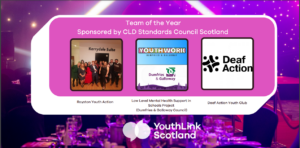Sponsored by CLD Standards Council
There’s no I in Team. And there’s no denying that some of the best youth work happens in partnership. Our nominees are empowering staff and volunteers to deliver high-quality youth work services together.

Royston Youth Action’s (RYA) ultimate goal is to foster a sense of family within the community. All the young people they work with are part of their family, a youth work team that believe all young people have a right to grow up loved and respected, summed up nicely by one of the young people:
“What is the RYA to me? Well, it’s a place I can be me, it’s a second home, a second family. It’s a place I feel my happiest and most supported.
“I love the staff! I truly don’t think it would be Royston Youth Action without them, they are the most inspirational people I know. I don’t think I would be the person I am without them and this club.”
The community around young people is hugely important to the success of their youth work, bringing family together, as well as wider education. Recognising the need for more family-centred activities, RYA has created family drop-ins, cold water therapy sessions, and tots and carers clubs. These programmes are in addition to their existing 25 clubs for young people and children, as well as their work with primary and secondary schools.
It’s more than just a team; it’s a family. All RYA’s youth workers leave a lasting imprint on the lives and happy memories of those they have cared for. And the proof? The number of young people who return as volunteers, who want to give back to the team that gave them so much.
Dumfries and Galloway’s groundbreaking mental health project for secondary pupils, could be the blueprint for the rest of Scotland.
It’s a first in the country, a partnership with the council’s youth work and educational psychology teams, alongside schools and the NHS.
Youth workers play a crucial role in helping young people understand their emotions, navigate distressing experiences, and develop effective coping strategies. By blending counselling skills with youth work expertise, the team creates a supportive and non-judgmental environment through this unique approach.
The positive outcomes are clear as young people achieve milestones they previously struggled with, highlighting the importance of this early intervention work.
It’s about effective communication, collaboration, a non-judgmental environment, patience, and encouragement. By involving young people in shaping the project, the team has ensured the services provided are tailored to meet the needs of the young people they support.
The project does not replace clinical interventions, but acts as a vital first point of contact, signposting young people to specialised services when needed. And this is a model that has gained recognition and support from mental health organisations who see the impact on young people’s mental wellbeing.
The success of this joint venture has led to a dedicated mental health pathway for young people in Dumfries and Galloway. This transformative project showcases the power of youth work’s role in providing mental health services, enabling young people to access the support they need in times of distress and challenges.
In Scotland, young deaf people face significant challenges, with even mild deafness having a negative impact on their lives.
Limited contact with deaf peers hampers their ability to build relationships, feel part of a community, and develop a positive deaf identity, while 50% do not have any communication support from their local authority. On top of this, many live with the additional barriers of poverty and opportunity.
However, a dedicated team in Scotland is making a remarkable impact on the lives of deaf young people.
One of the team’s strengths lies in the presence of Deaf British Sign Language (BSL) professionals who empower deaf young people to become young leaders. These young leaders actively shape the programme and lead sessions, providing diverse role models and fostering positive deaf identities. The team members, with varying levels of hearing loss and language needs, serve as positive role models, offering shared experiences of growing up deaf in Scotland.
Billy-Jack Gerrard talks about his experience as a young leader: “I feel this is an incredible sense of empowerment as it has encouraged my independence, helped me realise a sense of responsibility and it has given me a big confidence boost.”
Supported by youth workers, the youth service’s support and events have led to increased attendance, improved family engagement, and partnerships with schools, local authorities, and NHS Audiology across Scotland.
With around 3,500 deaf young people in Scotland facing challenges such as limited peer contact and poverty, the work of the youth service is crucial in empowering them to thrive and fostering a positive deaf identity.